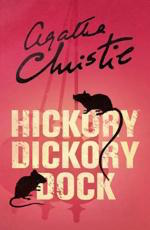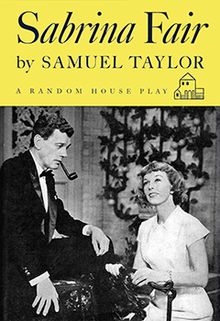
Poirot Score: 65
Hickory Dickory Dock
☆☆☆
Reasons for the Poirot Score:
This book deals sympathetically with multiracial London of the 1950s, and the increased number of University students – both women and men.
It also introduces Miss Felicity Lemon as Poirot’s secretary. Miss Lemon had appeared in Parker Pyne Investigates [1934] short stories, but with no real character behind the name. It is not clear when Miss Lemon left Mr Pyne’s agency, and when she started working for Poirot.
Hickory Dickory Dock has a complex criminal plot that does not convince, but is clever. Some aspects of the murders are well and fairly clued, while other areas are more obscure.
There is sly humour at British xenophobia. Inspector Sharpe asks Poirot to explain about the foreigners; Poirot points out there are no Belgians
You mean that as you’re a Belgian, all the other nationalities are as foreign to you as they are to me.
Click here for full review (spoilers ahead)
Trivia
Multiracial Britain of the 1950s
Christie was always alive to change in her environment. This is her first book depicting equality in higher education between women and men, and a completely integrated multiracial boarding house. Both these changes occurred in post Second World War Britain. Neither Christie, nor her sister had gone to University. They were well brought up Victorian girls. Miss Agatha Miller, born in 1890, was brought up to be a debutante, marry well and live comfortably, organising charitable endeavours. Christie charts the shocking social changes brought about by War. Christie herself first worked during the First World War as a pharmacy assistant. Through her character of fearless Tuppence Beresford in the Secret Adversary [1922], Christie described how girls who had worked during the war were not going to go back in their boxes, meekly serving curates tea on the lawn. They had become working girls and demanded wages and the vote.
After the Second World War, higher education became an option to families who had never sent anyone to University before. This is true of all four of our parents.
In 1948 the Empire Windrush transport ship brought 1,027 passengers from Jamaica to London. Not all of these people were Jamaican, some were service men on leave, some were Polish refugees who had fled Europe and now wished to return. There were always people from around the globe, living in Britain, especially with Britain’s colonial links. In 1922 Christie’s brother, Monty Miller, returned to England with an African servant, Shebani, whose wages Christie and her sister jointly paid. Christie had to persuade her mother’s two elderly maids they need have no anxiety sharing the servants’ quarters with ‘a heathen’. See The Sittaford Mystery for a probable portrait of Shebani. In Sittaford, a village busybody, Mrs Curtis observes ‘That nasty native servant of his – what does he know about cleaning? Nasty black fellow.”
Major Burnaby counters this attack with absolute truth and fairness
Nothing better than a native servant. They know their job and they don’t talk.
British India acquired independence in 1947, splitting into India and the two Pakistans. There were deep concerns that millions of refugees that fled across the boarders might not get citizenship in these new countries and be stateless. The 1948 British Nationality Act was a response from the UK to its old empire, when those countries demanded autonomy. ‘Every person who under this Act is a citizen of the United Kingdom and Colonies … shall by virtue of that citizenship have the status of a British subject’. It was an attempt to foster the Commonwealth. West Indian migration for 1954 was running at the level of 10,000 compared to 2,000 in previous years. Many young students from all over the world, but especially from Britain’s colonies, flocked to the UK to gain a British University degree. Some then stayed in the UK, most returned to their countries to work, as Elizabeth Johnson intends to do in Hickory Dickory Dock.
The Suez Crisis:
In Hickory Dickory Dock, a student, Achmed Ali, is described as ‘ Egyptian and frightfully political’.
‘You ask why does Egypt resent the Suez Canal?’

The Suez canal has been in the news in 2021 because it was temporarily blocked by a massive ship. The canal was opened in 1869 to link the Indian Ocean with the Mediterranean, so ships did not have to sail around the African continent. Verdi was commissioned to write Aida to celebrate the opening.
Britain had a huge military base in Suez post Second World War. Tensions between Egypt and Britain grew 1951-56. A military coup in 1952 removed King Farouk, and President Nasser took control. In 1956 Nasser nationalised the Suez Canal, which precipitated the Suez crisis. Israel, Britain and France invaded Egypt, which ultimately led to condemnation by the United Nations. Sir Anthony Eden, Britain’s Prime Minister, resigned, humiliated.
Christie wrote this book before the Suez Crisis, but she could see the writing on the wall. Christie and her husband, Max Mallowan, spent much time in the Middle East as Mallowan’s career was Mesopotamian archaeology. Mallowan had also spent the entire Second World War in the Middle East in the Army, as he could speak arabic. The Mallowans had a deep understanding of Egyptian culture and politics. Max Mallowan’s old schoolfriend, Humphrey Trevelyan, was British Ambassador to Egypt at this time (see Dead Man’s Folly 1956 Trivia for more information).
Sabrina Fair

The beauty salon in Hickory Dickory Dock is called Sabrina Fair.
Detective-constable McCrae knows it’s Milton: ‘Blasphemy, I call it’
In John Milton’s masque Comus (1634):
Sabrina fair,
Listen where thou art sitting
Under the glassy, cool, translucent wave,
In twisted braids of lilies knitting
The loose train of thy amber-dropping hair;
Listen for dear honour’s sake,
Goddess of the silver lake,
Listen and save.
Christie has previously written about the ballet of Comus with Margot Fonteyn in 1951 They Came To Baghdad.
There was also a play, Sabrina Fair, by Taylor that was performed at the National Theatre, London, in 1953. Which seems a more likely source of the beauty salon’s name.
Hickory Dickory Dock
This novel is the last in a sequence of Christie’s nursery rhyme novel titles.
And Then There Were None [1939]
One, Two, Buckle My Shoe [1940]
Five Little Pigs [1942]
Crocked House [1949]
A Pocket Full of Rye [1953]
Hickory Dickory Dock [1955]
Unlike the other novels there is very little reference to the rhyme in the story, except the rooming house is in Hickory Road. Indeed, the manager of the Hickory Road house, Mrs. Hubbard, comes from another nursery rhyme, nor does she have a pet dog. There is no grandfather clock to chime one, and no mouse runs down. Perhaps Christie felt after this book, nursery rhymes had lost their charm.

